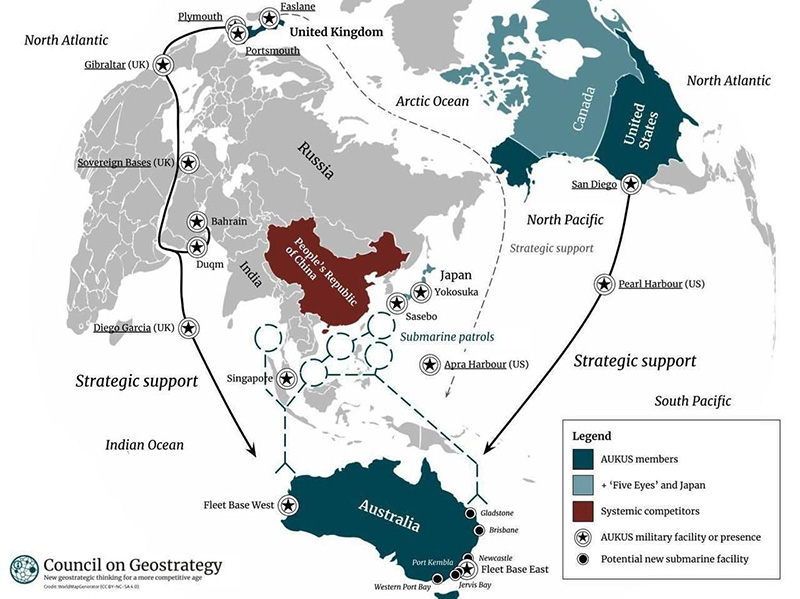British PM Rishi Sunak (on right) US President Joe Biden (centre) and Australian PM Anthony Albanese (left) at a naval base in California.
The United States, Australia and the United Kingdom are traveling “further down the wrong and dangerous path for their own geopolitical self-interest,” China’s Foreign Ministry said, responding to an agreement under which Australia will purchase nuclear-powered attack submarines from the U.S. to modernize its fleet.
Spokesperson Wang Wenbin said the arrangement, given the acronym AUKUS — for Australia, the United Kingdom and the United States — arises from the “typical Cold War mentality which will only motivate an arms race, damage the international nuclear nonproliferation regime, and harm regional stability and peace,” writes ‘The Washington Post’.
AUKUS is one of several U.S.-led security arrangements that have drawn fire from Beijing, which routinely rails against regional blocs from which it is excluded as vestiges of the Cold War.
“The latest joint statement issued by the U.S., U.K., and Australia shows that the three countries have gone further down the wrong and dangerous path for their own geopolitical self-interest, completely ignoring the concerns of the international community,” Wang told reporters at a daily briefing.
U.S. President Joe Biden flew to San Diego to appear with Australian Prime Minister Anthony Albanese and British Prime Minister Rishi Sunak as they hailed an 18-month-old nuclear partnership that enables Australia to access nuclear-powered submarines, which are stealthier and more capable than conventionally powered vessels, as a counterweight to China’s military buildup.
Biden emphasized the ships would not carry nuclear weapons of any kind. “The three countries claim that they will abide by the highest nuclear non-proliferation standards, which is pure deception,” Wang said, accusing the three of “coercing” the International Atomic Energy Agency into giving its endorsement.
Australia’s defense minister said AUKUS was necessary to counter the biggest conventional military buildup in the region since World War II. Australian officials said the deal will cost up to $245 billion over the next three decades.
Recent days have seen officials from President Xi Jinping down issue dire pronouncements on U.S. China relations and Chinese security in general.
Foreign Minister Qin Gang warned Washington of possible “conflict and confrontation” if the U.S. doesn’t change course to mend relations strained over Taiwan, human rights, Hong Kong, security, technology and the Russian invasion of Ukraine.
A day earlier, Xi told delegates of China’s rubber-stamp legislature that “Western countries led by the United States have implemented all-round containment, encirclement and suppression of China, which has brought unprecedented grave challenges to our nation’s development.”
Xi said it was necessary to modernize the armed forces and “build the people’s army into a great wall of steel” that protects China’s interests and national security. Xi also reiterated China’s determination to bring Taiwan under its control by peaceful or military means amid rising concern abroad over a possible attack on the island Beijing claims as its own territory.
China must “resolutely oppose interference by external forces and Taiwan independence separatist activities, and unswervingly promote the process of reunification of the motherland,” Xi said.
China accused the UK, US and Australia of 'going down a dangerous path' today after the historic nuclear submarine deal. Beijing's Foreign Ministry said the AUKUS pact breaks the non-proliferation treaty and is evidence of a 'typical Cold War mentality,’ London’s ‘The Daily Mail’ expresses British approach.
Security minister Tom Tugendhat risked inflaming tensions further by insisting that China is a 'threat' – despite a government review carefully avoiding using the word.
Britain's fleet of nuclear-powered hunter-killer submarines could be doubled as part of a landmark deal with the US and Australia. As part of the deal, military chiefs are pushing to increase the size of the UK's hunter-killer submarine fleet from seven to as many as 20.
The vessels will not be nuclear-armed and the “Treaty on the non-proliferation of nuclear weapons” (NPT) allows the transfer of fissile material for non-weapons use, like naval propulsion, without the need for monitoring by the UN watchdog, the International Atomic Energy Agency.
However, in a series of tweets, the Chinese mission to the UN said the move clearly breached the 'object and purpose' of the NPT: “The irony of AUKUS is that two nuclear weapons states who claim to uphold the highest nuclear non-proliferation standard are transferring tons of weapons-grade enriched uranium to a non-nuclear-weapon state, clearly violating the object and purpose of the NPT.”
…This is a map of the military-strategic confrontation in the Pacific:

read more in our Telegram-channel https://t.me/The_International_Affairs

 9:56 31.03.2023 •
9:56 31.03.2023 •























